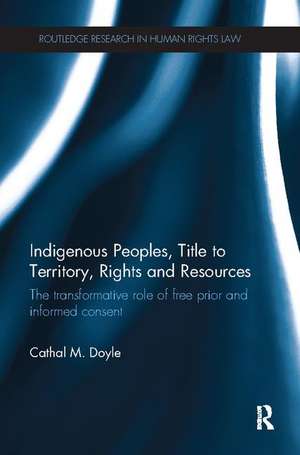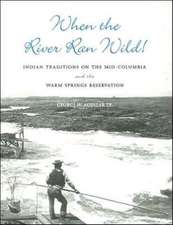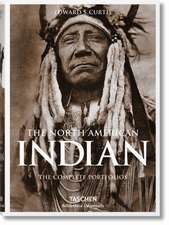Indigenous Peoples, Title to Territory, Rights and Resources: The Transformative Role of Free Prior and Informed Consent: Routledge Research in Human Rights Law
Autor Cathal M. Doyleen Limba Engleză Paperback – 3 iul 2017
Cathal Doyle examines the evolution of the contemporary concept of FPIC and the main challenges and debates associated with its recognition and implementation. Drawing on existing jurisprudence and evolving international standards, policies and practices, Doyle argues that FPIC constitutes an emerging norm of international law, which is derived from indigenous peoples’ self-determination, territorial and cultural rights, and is fundamental to their realization. This rights consistent version of FPIC guarantees that the responses to questions and challenges posed by the extractive industry’s increasingly pervasive reach will be provided by indigenous peoples themselves.
The book will be of great interest and value to students and researchers of public international law, and indigenous peoples and human rights.
| Toate formatele și edițiile | Preț | Express |
|---|---|---|
| Paperback (1) | 418.77 lei 6-8 săpt. | |
| Taylor & Francis – 3 iul 2017 | 418.77 lei 6-8 săpt. | |
| Hardback (1) | 1061.06 lei 6-8 săpt. | |
| Taylor & Francis – 25 noi 2014 | 1061.06 lei 6-8 săpt. |
Din seria Routledge Research in Human Rights Law
-
 Preț: 327.55 lei
Preț: 327.55 lei -
 Preț: 309.90 lei
Preț: 309.90 lei -
 Preț: 328.25 lei
Preț: 328.25 lei -
 Preț: 386.21 lei
Preț: 386.21 lei - 8%
 Preț: 388.56 lei
Preț: 388.56 lei -
 Preț: 312.02 lei
Preț: 312.02 lei - 20%
 Preț: 268.89 lei
Preț: 268.89 lei -
 Preț: 311.18 lei
Preț: 311.18 lei -
 Preț: 384.91 lei
Preț: 384.91 lei -
 Preț: 327.10 lei
Preț: 327.10 lei -
 Preț: 326.49 lei
Preț: 326.49 lei - 9%
 Preț: 936.56 lei
Preț: 936.56 lei -
 Preț: 319.01 lei
Preț: 319.01 lei -
 Preț: 341.55 lei
Preț: 341.55 lei - 18%
 Preț: 1167.58 lei
Preț: 1167.58 lei - 18%
 Preț: 1058.38 lei
Preț: 1058.38 lei - 18%
 Preț: 1058.65 lei
Preț: 1058.65 lei - 18%
 Preț: 1056.28 lei
Preț: 1056.28 lei - 26%
 Preț: 822.34 lei
Preț: 822.34 lei - 18%
 Preț: 1172.58 lei
Preț: 1172.58 lei - 25%
 Preț: 823.63 lei
Preț: 823.63 lei -
 Preț: 371.64 lei
Preț: 371.64 lei -
 Preț: 473.88 lei
Preț: 473.88 lei - 18%
 Preț: 1110.92 lei
Preț: 1110.92 lei - 26%
 Preț: 847.31 lei
Preț: 847.31 lei -
 Preț: 369.73 lei
Preț: 369.73 lei -
 Preț: 464.16 lei
Preț: 464.16 lei - 18%
 Preț: 1169.97 lei
Preț: 1169.97 lei - 25%
 Preț: 824.17 lei
Preț: 824.17 lei - 18%
 Preț: 1117.88 lei
Preț: 1117.88 lei - 18%
 Preț: 1057.57 lei
Preț: 1057.57 lei - 18%
 Preț: 1061.06 lei
Preț: 1061.06 lei - 18%
 Preț: 1111.58 lei
Preț: 1111.58 lei - 18%
 Preț: 1057.75 lei
Preț: 1057.75 lei - 18%
 Preț: 1109.18 lei
Preț: 1109.18 lei - 18%
 Preț: 1061.57 lei
Preț: 1061.57 lei -
 Preț: 475.16 lei
Preț: 475.16 lei - 18%
 Preț: 1059.48 lei
Preț: 1059.48 lei - 18%
 Preț: 1060.52 lei
Preț: 1060.52 lei -
 Preț: 414.32 lei
Preț: 414.32 lei - 18%
 Preț: 1053.92 lei
Preț: 1053.92 lei -
 Preț: 423.30 lei
Preț: 423.30 lei
Preț: 418.77 lei
Nou
Puncte Express: 628
Preț estimativ în valută:
80.13€ • 83.88$ • 66.69£
80.13€ • 83.88$ • 66.69£
Carte tipărită la comandă
Livrare economică 31 martie-14 aprilie
Preluare comenzi: 021 569.72.76
Specificații
ISBN-13: 9781138280465
ISBN-10: 1138280461
Pagini: 366
Dimensiuni: 156 x 234 x 19 mm
Greutate: 0.51 kg
Ediția:1
Editura: Taylor & Francis
Colecția Routledge
Seria Routledge Research in Human Rights Law
Locul publicării:Oxford, United Kingdom
ISBN-10: 1138280461
Pagini: 366
Dimensiuni: 156 x 234 x 19 mm
Greutate: 0.51 kg
Ediția:1
Editura: Taylor & Francis
Colecția Routledge
Seria Routledge Research in Human Rights Law
Locul publicării:Oxford, United Kingdom
Public țintă
PostgraduateCuprins
Introduction Part I: The Role of Indigenous Peoples’ Consent in Legitimizing Title to Territory 1. The Genesis of Indigenous Consent under International Law and its role in Legitimizing Title to Territory 2. Nineteenth Century Positivists and divergence between the role of Consent in theory and practice Part II: The Requirement for Free Prior and Informed Consent in The Normative Framework of Indigenous Peoples Rights 3. The Evolving Consent Requirement Under The ILO System 4. The Self-Determination Grounded Normative Framework of Indigenous Rights 5. FPIC and the Normative Framework of Indigenous Peoples Rights 6. Debates in relation to the consent requirement Part III: Implementation of Free Prior and Informed Consent – Challenges and Opportunities 7. The Evolving Practice of States and International Organizations 8. FPIC and the Corporate Obligation to Respect Indigenous Peoples Rights 9. Operationalization of Consent, Challenges, Limitations and Opportunities Conclusion
Descriere
The right of indigenous peoples under international human rights law to give or withhold their Free Prior and Informed Consent (FPIC) to natural resource extraction in their territories is increasingly recognized by intergovernmental organizations, international bodies, and industry actors, as well as in the domestic law of some States. This book offers a comprehensive overview of the historical basis and status of the requirement for indigenous peoples’ consent under international law, examining its relationship with debates and practice pertaining to the acquisition of title to territory throughout the colonial era.








